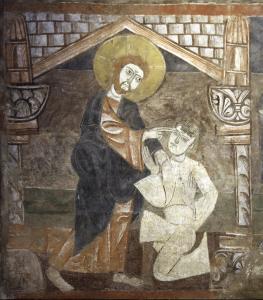
Paul once got in trouble trying to silence a woman from speak out the truth. He was jailed because he canceled her voice:
As we were going to the place of prayer, we were met by a slave girl who had a spirit of divination and brought her owners much gain by soothsaying. She followed Paul and us, crying, “These men are servants of the Most High God, who proclaim to you the way of salvation.” And this she did for many days. But Paul was annoyed, and turned and said to the spirit, “I charge you in the name of Jesus Christ to come out of her.” And it came out that very hour. But when her owners saw that their hope of gain was gone, they seized Paul and Silas and dragged them into the market place before the rulers; and when they had brought them to the magistrates they said, “These men are Jews and they are disturbing our city. They advocate customs which it is not lawful for us Romans to accept or practice.” The crowd joined in attacking them; and the magistrates tore the garments off them and gave orders to beat them with rods. And when they had inflicted many blows upon them, they threw them into prison, charging the jailer to keep them safely (Acts 16:16-23 RSV).
Jesus, on the other hand, helped give a blind man, not only giving him his eyesight, but his voice, but once Jesus did that, the blind man learned that many did not want to hear the truth which he had to speak:
They brought to the Pharisees the man who had formerly been blind. Now it was a sabbath day when Jesus made the clay and opened his eyes. The Pharisees again asked him how he had received his sight. And he said to them, “He put clay on my eyes, and I washed, and I see.” Some of the Pharisees said, “This man is not from God, for he does not keep the sabbath.” But others said, “How can a man who is a sinner do such signs?” There was a division among them. So they again said to the blind man, “What do you say about him, since he has opened your eyes?” He said, “He is a prophet” (Jn. 8:13-17 RSV).
Not everyone intends good when they speak some element of the truth. Similarly, many people might say something, and there is truth in what they have to say, but they are coerced or forced to speak, limiting the value of their speech. Thus, while the woman spoke some element of the truth, Paul understood she was not speaking under her own authority, with her own voice, and so by silencing her, he freed her from what had taken over her life. What she said was true, but it was being used to cause confusion. She was being led to speak out of turn, to speak when it would disrupt Paul and his work. Thus, we must always look, not only to what someone says, but why they say it. We must discern how much freedom they had. We must look at the intended consequences of their speech.
Paul was a servant of God. He pointed the way to salvation. The woman was right, but Paul knew, the woman was not speaking on her own behalf. She was not free to follow Paul. She was a slave, both in body and in spirit. Paul knew that if he accepted the woman’s slavery, her own subjugation, by allowing her to continue to be forced to speak, he would lose the opportunity to help her, indeed, to free her. Then, what happened to her, would in part, be on him. This is why he set her free; he silenced her in order to remove the compulsion she felt to speak, that is, to counter what afflicted her, from what was inside her, making her to speak out of turn. She was a slave girl; being set free from that inner compulsion also set her free from the way her owners wanted to use her. He gave her some of her dignity back, and her owners did not like that. Paul effectively closed them down, cancelling their money making scheme by giving the woman her own freedom back, making it so she could and would be able to speak by her own accord and not have to say what others told her to say and do.
Jesus, likewise, allowed the man born blind find his innate human dignity Many assumed that the reason why he was blind was because of something he or his parents had done, and so he deserved not only to be blind, but to be shamed for what they presumed he had done. Thus, when Jesus healed him, he found out people didn’t want to listen; they said the man born blind was a sinner, and as he was a sinner, nothing he said was worth listening to:
And they reviled him, saying, “You are his disciple, but we are disciples of Moses. We know that God has spoken to Moses, but as for this man, we do not know where he comes from.” The man answered, “Why, this is a marvel! You do not know where he comes from, and yet he opened my eyes. We know that God does not listen to sinners, but if any one is a worshiper of God and does his will, God listens to him. Never since the world began has it been heard that any one opened the eyes of a man born blind. If this man were not from God, he could do nothing.” They answered him, “You were born in utter sin, and would you teach us?” And they cast him out (Jn. 8:28-34 RSV).
The man spoke the truth, and with no evil intention. No one was using him to speak in order to make themselves wealthy. He spoke the truth, the truth of his experience, and instead of glorifying the way he had been freed from his blindness, people cast him aside as if he were a monster. He was unjustly judged. He suffered the fate of so many innocents, of those who are abused and mistreated. The man, like so many victims, was not what people claimed him to be. He was born blind due to no fault of his own. When he was healed by Jesus, he knew it was a good thing he had experienced, that he had been made better, and when he once again came across Jesus, he ended up worshiping Jesus:
Jesus heard that they had cast him out, and having found him he said, “Do you believe in the Son of man?” He answered, “And who is he, sir, that I may believe in him?” Jesus said to him, “You have seen him, and it is he who speaks to you.” He said, “Lord, I believe”; and he worshiped him (Jn. 8:35-38 RSV).
The man was set free, and in that freedom, he was able to see more than many others, for not only did he come to know Jesus as the Son of Man, that is, as the Messiah, he discerned that Jesus was someone to be worshiped. This means that he came to see the divinity in Jesus. The man worshiped Jesus, but not out of force; he wasn’t told what to say, he wasn’t told what to do, but rather, he apprehended it for himself, and so he worshiped Jesus, speaking the truth from the fullness of his being. It is only when the truth comes out of someone set free in this fashion does it have value, because it is not being used or subverted for some purpose other than the good which should come from the truth. This is why Paul knew he had to silence what the woman was saying, not because he wanted to cause her pain and sorrow, but because he knew she spoke, not from a sense of dignity and freedom, but out of a compulsion which did not allow her the dignity and respect she should have had. Paul and Jesus both set people free, and in setting them free, restored to them the dignity which had been taken away from them.
Stay in touch! Like A Little Bit of Nothing on Facebook.
If you liked what you read, please consider sharing it with your friends and family!












